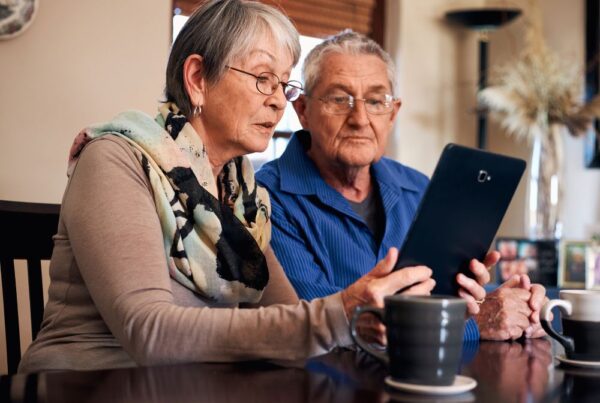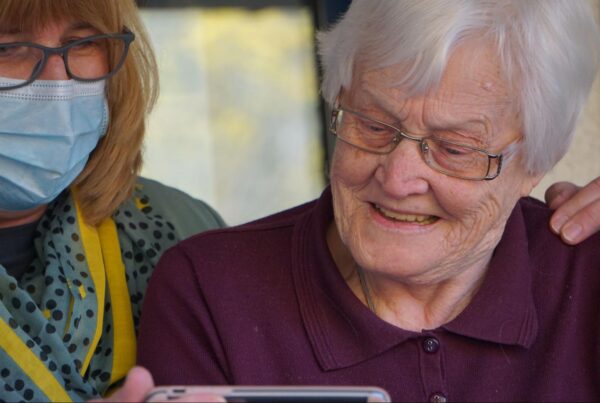Addressing Sleep Apnea in Seniors: Signs, Treatments, and Home Adjustments
Key Takeaways
- Sleep apnea is a common yet serious condition in seniors, affecting breathing and sleep quality.
- Symptoms include loud snoring, daytime fatigue, morning headaches, and pauses in breathing during sleep.
- Treatments include CPAP therapy, lifestyle changes, oral appliances, and, in some cases, surgery.
- Home adjustments like elevating the head of the bed and maintaining a consistent sleep schedule can improve sleep quality.
- Advanced Care offers personalized support to help seniors manage sleep apnea effectively.
How Can Seniors Manage Sleep Apnea?
Seniors can manage sleep apnea through CPAP therapy, oral appliances, lifestyle changes, and home adjustments. Regular medical evaluations and creating a sleep-friendly environment can improve sleep quality and reduce health risks associated with untreated sleep apnea.
Improving Sleep and Health for Seniors with Sleep Apnea
Left untreated, sleep apnea can lead to heart disease, cognitive decline, and other complications. Recognizing symptoms and implementing treatment options is crucial. Learn how Advanced Care supports seniors with sleep apnea through personalized care and home adjustments for better rest and well-being.
Sleep is essential for physical and mental well-being, yet many seniors struggle with conditions that disrupt restful sleep. One of the most common and serious sleep disorders affecting older adults is sleep apnea. This condition can lead to significant health risks if left untreated, including cardiovascular issues, cognitive decline, and decreased quality of life. At Advanced Care, we recognize the impact of sleep apnea on seniors and are committed to helping families understand the signs, explore treatment options, and make home adjustments to support better sleep.
What is Sleep Apnea?
Sleep apnea is a disorder characterized by repeated interruptions in breathing during sleep. These pauses in breathing, known as apneas, can last from a few seconds to over a minute and may occur hundreds of times per night. There are two main types of sleep apnea:
- Obstructive Sleep Apnea (OSA): The most common type, OSA occurs when the muscles in the throat relax excessively, blocking the airway during sleep. This can cause loud snoring, gasping, or choking sounds as the individual struggles to breathe.
- Central Sleep Apnea: Less common but equally serious, central sleep apnea happens when the brain fails to send proper signals to the muscles that control breathing. This type of sleep apnea is often associated with underlying medical conditions affecting the brainstem or heart.
Why Seniors Are at Greater Risk
Several factors contribute to an increased risk of sleep apnea in seniors:
Age-Related Muscle Changes
As we age, the muscles that keep the airway open during sleep can weaken, making it more likely for the airway to collapse. This is particularly true for the muscles in the throat and tongue, which are essential for maintaining an open airway during sleep.
Medical Conditions
Seniors are more likely to have conditions such as obesity, heart disease, and diabetes, all of which can increase the risk of sleep apnea. Obesity, in particular, is a significant risk factor because excess weight around the neck can narrow the airway and make it more prone to collapse during sleep.
Medication Use
Certain medications commonly prescribed to seniors, such as sedatives or muscle relaxants, can affect breathing patterns and contribute to sleep apnea symptoms. These medications may cause the muscles in the throat to relax excessively, increasing the likelihood of airway obstruction during sleep.
Signs and Symptoms of Sleep Apnea in Seniors
Sleep apnea can be challenging to recognize, especially since many symptoms occur during sleep. However, there are several signs to watch for:
1. Loud Snoring
While not everyone who snores has sleep apnea, loud, chronic snoring is a common symptom, particularly when accompanied by gasping or choking sounds. This type of snoring is often disruptive to both the individual and their sleeping partner and may be an indicator of obstructed breathing during sleep.
2. Pauses in Breathing
Family members or caregivers may notice episodes where the senior stops breathing momentarily during sleep, followed by sudden gasping or choking. These apneic events can occur multiple times throughout the night and may be alarming to witness.
3. Excessive Daytime Sleepiness
Seniors with sleep apnea often feel unusually tired during the day, even after a full night’s sleep. This can lead to difficulty concentrating, irritability, and an increased risk of accidents. Daytime fatigue may also cause seniors to fall asleep during activities such as reading, watching television, or even driving.
4. Morning Headaches
Frequent morning headaches can result from oxygen deprivation during the night. When breathing is repeatedly interrupted, the brain may not receive sufficient oxygen, leading to headaches upon waking.
5. Dry Mouth or Sore Throat
Waking up with a dry mouth or sore throat is common due to breathing through the mouth during apneic episodes. This can also contribute to dental problems, as a dry mouth can increase the risk of tooth decay and gum disease.
6. Restless Sleep
Frequent awakenings, tossing and turning, or waking up feeling unrefreshed are typical indicators of disrupted sleep patterns caused by sleep apnea. Seniors may have difficulty falling asleep or staying asleep throughout the night, leading to poor sleep quality overall.
7. Cognitive Impairment
Memory problems, confusion, or difficulty focusing may be exacerbated by the poor sleep quality associated with sleep apnea. Chronic sleep deprivation can have a significant impact on cognitive function, particularly in older adults who may already be experiencing age-related cognitive changes.
Health Risks Associated with Untreated Sleep Apnea
If left untreated, sleep apnea can lead to a range of serious health complications, including:
- High Blood Pressure: Repeated oxygen deprivation during apneic episodes can cause a surge in blood pressure, increasing the risk of hypertension. Over time, this can lead to persistent high blood pressure, even during waking hours, raising the risk of heart disease and stroke.
- Heart Disease: Sleep apnea is linked to various cardiovascular problems, including irregular heart rhythms, heart attacks, and heart failure. The strain placed on the heart during apneic episodes can cause long-term damage and increase the risk of life-threatening cardiac events.
- Type 2 Diabetes: The stress caused by interrupted sleep can affect insulin regulation, increasing the risk of developing type 2 diabetes. Additionally, individuals with sleep apnea are more likely to have difficulty managing their blood sugar levels, leading to complications associated with diabetes.
- Cognitive Decline: Poor sleep quality and chronic oxygen deprivation can accelerate cognitive decline in older adults. Sleep apnea has been linked to an increased risk of dementia, including Alzheimer’s disease, as well as problems with memory, attention, and executive function.
- Depression and Anxiety: The fatigue, irritability, and decreased quality of life associated with sleep apnea can contribute to the development or worsening of mood disorders such as depression and anxiety. Treating sleep apnea can often lead to improvements in mood and overall mental well-being.
Diagnosing Sleep Apnea in Seniors
Sleep Studies
To diagnose sleep apnea, healthcare providers may recommend a sleep study, either in a sleep clinic or at home. These studies, known as polysomnograms, involve monitoring various aspects of sleep, including:
- Breathing patterns and airflow
- Oxygen levels in the blood
- Heart rate and rhythm
- Brain activity
- Eye and leg movements
By analyzing the data collected during a sleep study, healthcare providers can identify the presence and severity of sleep apnea, as well as any other sleep disorders that may be present.
Medical Evaluation
In addition to a sleep study, a thorough medical evaluation is essential for diagnosing sleep apnea in seniors. This may include:
- A review of symptoms and medical history
- A physical examination focusing on the nose, throat, and neck
- An assessment of risk factors, such as obesity or underlying medical conditions
- Additional tests, such as imaging or blood work, to rule out other potential causes of sleep disturbances
Treatment Options for Sleep Apnea
1. Continuous Positive Airway Pressure (CPAP)
CPAP therapy is the most common and effective treatment for obstructive sleep apnea. It involves wearing a mask over the nose or mouth during sleep, which delivers a continuous stream of air to keep the airway open. The pressure of the air is adjusted to a level that prevents the airway from collapsing, allowing for uninterrupted breathing throughout the night.
While it may take time to adjust to wearing a CPAP mask, the benefits of this therapy are significant. Consistent use of CPAP can improve sleep quality, reduce daytime fatigue, and lower the risk of associated health complications.
2. Bi-Level Positive Airway Pressure (BiPAP)
For seniors who have difficulty tolerating CPAP, BiPAP machines offer a more flexible option. Unlike CPAP, which delivers a constant pressure, BiPAP provides different pressure levels for inhalation and exhalation. This can make breathing feel more natural and comfortable, particularly for individuals with central sleep apnea or certain respiratory conditions.
3. Oral Appliances
Dentists can fit seniors with custom oral appliances that reposition the jaw and tongue to keep the airway open during sleep. These devices, also known as mandibular advancement devices (MADs), are less intrusive than CPAP machines and may be more comfortable for some individuals. Oral appliances are most effective for mild to moderate cases of obstructive sleep apnea and can be a good alternative for those who cannot tolerate CPAP therapy.
4. Lifestyle Changes
In addition to medical treatments, lifestyle changes can play a significant role in managing sleep apnea symptoms. Some important modifications include:
- Weight management: Losing excess weight can help reduce the severity of sleep apnea by decreasing pressure on the airway.
- Regular exercise: Engaging in physical activity can improve sleep quality and help with weight management, both of which can alleviate sleep apnea symptoms.
- Avoiding alcohol and sedatives: These substances can relax the muscles in the throat, exacerbating sleep apnea symptoms. It’s best to avoid them, especially in the hours leading up to bedtime.
- Sleeping on one’s side: Sleeping on the back can cause the tongue and soft tissues to collapse into the airway. Encouraging side sleeping can help keep the airway open.
5. Surgical Options
In severe cases where other treatments are ineffective, surgery may be recommended to treat sleep apnea. Surgical options can include:
- Uvulopalatopharyngoplasty (UPPP): This procedure involves removing excess tissue from the throat to widen the airway.
- Maxillomandibular advancement (MMA): This surgery involves moving the upper and lower jaws forward to create more space behind the tongue, reducing airway obstruction.
- Hypoglossal nerve stimulation: This involves implanting a device that stimulates the nerve controlling tongue movement, preventing it from blocking the airway during sleep.
It’s important to note that surgical options are typically reserved for severe cases and may not be appropriate for all seniors. The decision to pursue surgery should be made in consultation with a healthcare provider who specializes in sleep disorders.
Home Adjustments to Support Better Sleep
Creating a sleep-friendly environment is essential for seniors with sleep apnea. Consider these home adjustments to improve comfort and safety:
1. Adjusting Sleep Position
Elevating the head of the bed or using specially designed pillows can help keep the airway open by preventing the tongue and soft tissues from collapsing into the back of the throat. Seniors should also be encouraged to sleep on their sides, which reduces the risk of airway obstruction compared to sleeping on the back.
2. Maintaining a Consistent Sleep Schedule
Encouraging regular sleep and wake times helps regulate the body’s internal clock, improving sleep quality. A bedtime routine that includes relaxation techniques, such as reading, listening to soothing music, or practicing gentle stretches, can help signal to the body that it’s time to wind down and prepare for sleep.
3. Controlling the Bedroom Environment
Creating an optimal sleep environment is crucial for promoting restful sleep. The bedroom should be cool, dark, and quiet. Consider using blackout curtains or an eye mask to block out light, and earplugs or a white noise machine to minimize disruptive sounds. Ensuring a comfortable mattress and pillows can also improve sleep quality.
4. Removing Safety Hazards
Sleep apnea can increase the risk of nighttime confusion, dizziness, or falls, particularly if seniors need to get up during the night to use the bathroom. To minimize these risks, ensure that the bedroom and any paths to the bathroom are free from tripping hazards such as loose rugs or cluttered floors. Installing nightlights or motion-activated lights can help seniors navigate safely if they wake up during the night.
5. Monitoring for Symptoms
Family members and caregivers can play a critical role in monitoring sleep apnea symptoms and treatment effectiveness. Keeping a sleep diary to note changes in sleep patterns, daytime fatigue, mood, or other symptoms can provide valuable information for healthcare providers. If symptoms persist or worsen despite treatment, it’s essential to follow up with a sleep specialist to explore additional options or adjustments.
How Advanced Care Supports Seniors with Sleep Apnea
At Advanced Care, we understand the challenges sleep apnea presents for seniors and their families. Our compassionate caregivers are trained to provide personalized support to help manage sleep apnea symptoms and promote overall well-being. Some of the ways we assist seniors with sleep apnea include:
- Helping with CPAP or BiPAP equipment setup, cleaning, and maintenance
- Assisting with oral appliance use and care
- Implementing home adjustments to create a sleep-friendly environment
- Monitoring sleep patterns and symptoms to identify potential issues
- Providing respite care to allow family caregivers time to rest and recharge
- Coordinating with healthcare providers to ensure comprehensive, cohesive care
We work closely with seniors and their families to develop individualized care plans that address the unique challenges of sleep apnea while promoting comfort, safety, and independence.
Final Thoughts
Sleep apnea is a serious condition that can significantly impact a senior’s health, cognitive function, and quality of life. By understanding the signs and symptoms, exploring appropriate treatment options, and making home adjustments to support better sleep, seniors and their families can effectively manage sleep apnea and its associated risks.
At Advanced Care, we are dedicated to supporting seniors and their loved ones in navigating the challenges of sleep apnea and promoting healthy aging. Our team of experienced caregivers is committed to providing the highest quality of care, empowering seniors to live their best lives with the support, respect, and dignity they deserve.
If you or a loved one is struggling with sleep apnea, know that you are not alone. Reach out to Advanced Care today to learn more about our services and how we can help you on your journey to better sleep and improved well-being.






